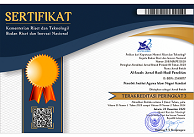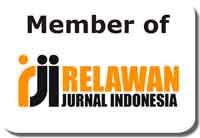Organizational Culture Dimensions in the Management of PM Gontor 7 Putera, Southeast Sulawesi
Abstract
This article aims to investigate: (1) ideas and ideals of the establishment of PM Gontor; (2) Phases of the grounding of Gontor's PM ideas; 3) Proliferation of PM Gontor as the largest pesantren corporation in Indonesia; 4) Elements of Gontor's organizational culture. Data was collected through interviews, observations, and documentation studies. Data analysis was carried out through four stages, namely: domain analysis, taxonomic analysis, compound analysis, and analysis of cultural themes. The results showed: (1) The existence of PM Gontor started with Pesantren Tegalsari ideas about the responsibility of advancing the Islamic Ummah and seeking the pleasure of Allah SWT; (2) The earthing phases of PM Gontor's ideas stretched during the founding of Old Gontor, the planting of shared values in the New Gontor era, instilling shared values through tiered education (3) The Gontor PM Proliferation is an effort to spread Gontor energy throughout Indonesia; (4) The elements of organizational culture in PM Gontor include the ideas/ideals of Tegalsari, educational strategies, shared values in the five souls, and the application of the five-term as a producer of the PM Gontor artifacts. The implication of this research is to continuously improve educational institutions by revitalizing the main dimensions of organizational culture.
Keywords
Full Text:
PDFReferences
Andrzej, H., Buchanan, D. A., & Huczynski, A. A. (2013). Organizational behaviour. London: Pearson.
Batmang. (2014). Pembelajaran Bahasa Arab di Pesantren Modern. Shautut Tarbiyah, Vol. 20 No. 1 .
Bolman, L. G., & Deal, T. E. (2017:251). Reframing Organizations: Artistry, Choice, and Leadership. John Wiley & Sons.
Darmadji, A. (2011). Pondok Pesantren dan Deradikalisasi Islam di Indonesia." Millah: Jurnal Studi Agama 11, no. 1. Millah: Jurnal Studi Agama, Vol. 11 No. 1 .
Daulay, H. H. (2014). Pendidikan Islam dalam Sistem Pendidikan Nasional di Indonesia. Jakarta: Kencana.
Fauzi, A., Baharun, H., Mundiri, A., & Manshur, U. (2018, November). E-Learning in Pesantren: Learning Transformation based on the Value of Pesantren. In Journal of Physics: Conference Series (Vol. 1114, No. 1, p. 012062). IOP Publishing.
Fetterman, D. M. (2009). Ethnography: Step-by-Step. Vol. 17. Sage Publication.
Genzuk, M. (2003). A synthesis of ethnographic research." Occasional Papers Series. Los Angeles: Center for Multilingual, Multicultural Research, Rossier School of EducationUniversity of Southern California, Los Angeles.
Hesket, J. L., & Kotter, J. P. (1992). Corporate culture and performance, Vol. 2 No. 5. Business Review.
Hill, C. W., Jones, G. R., & Schilling, M. A. (2014:167). Strategic management: theory: an integrated approach. Cengage Learning.
Indonesia, M. P. (2014). Peraturan Menteri Pendidikan dan Kebudayaan Republik Indonesia Nomor 137 Tahun 2014 Tentang Standar Nasional Pendidikan Anak Usia Dini. Jakarta: Kementerian Pendidikan dan Kebudayaan RI.
Kholil, M. (2011). Menggagas Pesantren sebagai Pusat Peradaban Muslim di Indonesia. Media Akademika, Vol. 26 No. 3 .
Mardiyah, M. (2012). Kepemimpinan Kiai dalam Memelihara Budaya Organisasi di Pondok Modern Gontor, Lirboyo Kediri, dan Pesantren T ebuireng Jombang. Tsaqafah, 8(1), 67-104.
Muhith, A. (2017). Kiai’s transformational leadership in establishing organizational culture at gender pesantren. Global Journal of Arts, Humanities and Social Sciences, UK, 6(1), 20-35.
Mundiri, A. (2017). Organizational Culture Base On Total Quality Management In Islamic Educational Institution. ADRI International Journal Of Islamic Studies and Social Sciences, 1(1).
Muttaqin, R. (2016). Kemandirian dan pemberdayaan ekonomi berbasis pesantren (studi atas peran Pondok Pesantren Al-ittifaq Kecamatan Rancabali Kabupaten Bandung terhadap kemandirian eknomi santri dan pemberdayaan ekonomi masyarakat sekitarnya). JESI (Jurnal Ekonomi Syari'ah Indonesia, Vol. 1 No. 2 .
Perawironegoro, D. (2018, December). The Relationship between Organizational Structure and Organizational Culture with Teacher Performance in Pesantren. In 3rd Annual International Seminar on Transformative Education and Educational Leadership (AISTEEL 2018) (pp. 710-716). Atlantis Press.
Pole, C., & Morrison, M. (2003). Ethnography for education. UK: McGraw-Hill Education.
Robbins, S. P. (1993). Organizational Behavior: Concepts, Controversies, and Applications. Video Enterprises, Incorporated.
Robbins, S. P., & Judge, T. A. (2013). Organizational Behavior, Fifteenth Edition. New Jersey: Prentice Hall.
Schein, E. H. (2010). Organizational Culture and Leadership. Vol. 2. John Wiley & Sons.
Spradley, J. P. (2016). The ethnographic interview. Waveland Press.
Stoner, J. A., Freeman, R. E., & Gilbert, D. R. (1995). Management. New Jersey: Prentice Hall Inc.
Sugiyono. (2005). Memahami Penelitian Kualitatif. Bandung: Alfabeta.
Syahrul. (2015). Kepemimpinan dan Inovasi Lembaga Pendidikan: Pengalaman Pondok Gontor VII Putra Sulawesi Tenggara. Al-Ta'dib, Vol. 8 No. 1 .
Syahrul, S., Mukhtar, M., & Akbar, M. (2018). Construction of Organizational Culture at PM Gontor VII Putera, South Konawe District, Southeast Sulawesi, Indonesia. International Journal of Advanced Engineering and Management Research, 3(5), 25-40.
Syahrul, S. (2018). Perjumpaan Demokrasi, Multikulturalisme dan Inklusifisme Pendidikan di PM Gontor 7 Putera, Konawe Selatan. Shautut Tarbiyah, Vol. 38 No. 24 .
Wahab, L. O. (2014). Perilaku Berbahasa Santri Pondok Modern Gontor Puudahoa. Al-Izzah: Jurnal Hasil-Hasil Penelitian, Vol. 9 No. 1 .
Wekke, I. S., & Hamid, S. (2013). Technology on language teaching and learning: a research on Indonesian pesantren. Procedia-Social and Behavioral Sciences, 83, 585-589.
Winardi, J. (2016). Manajemen Perubahan (The Management of Change), Edisi Pertama. Jakarta: Kencana.
DOI: http://dx.doi.org/10.31332/ai.v0i0.2492
Copyright (c) 2021 Syahrul Syahrul, Suryadi Suryadi

This work is licensed under a Creative Commons Attribution-NonCommercial-ShareAlike 4.0 International License.










